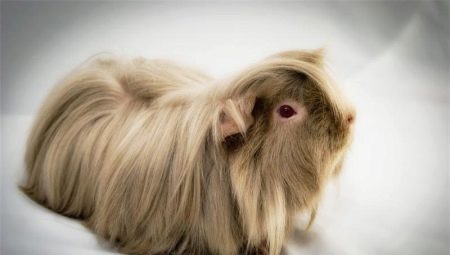Unfortunately, sooner or later you have to say goodbye to all your pets. Some of them stay with us for life, become real friends. The lives of others are more fleeting, but they also take root in our memory forever, evoking only the most pleasant memories. Sometimes I want to know how long this or that animal can be near, but because today we will talk about how many guinea pigs live. What determines their life expectancy?
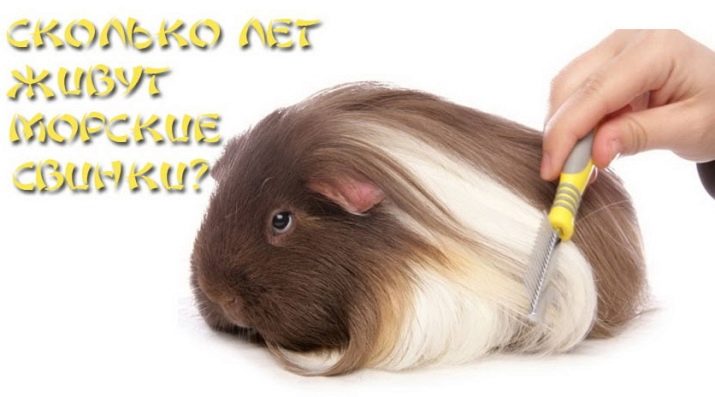
Life cycle and average indicators
Unlike other representatives of his squad, guinea pigs are considered to be real centenarians. The approximate life expectancy of these pets in captivity is up to 8 years, and in the natural environment – to 10. That is why they buy these animals - no one wants to say goodbye to a new family pet every year.
The homeland of these animals is considered South America, where they were first discovered by Europeans. Small animals caused a real sensation among the civilized audience: they were cute, charming, easy to care for and friendly. After the popularization of pigs around the world, numerous work began on the crossing and breeding of new decorative species. Unfortunately, selection has led to the fact that the life expectancy of new breeds has been significantly reduced (up to 5-7 years).
The most long-lived representative of these animals is a guinea pig-boy from England, he managed to deceive death up to 15 years (14 years and 9 months).
Depending on environmental conditions and care, the life span of guinea pigs can vary significantly. Why this happens, you can read a little lower.
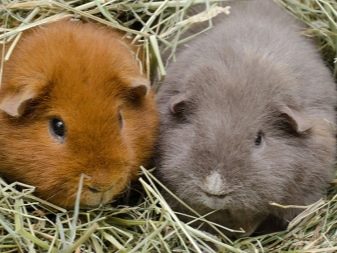
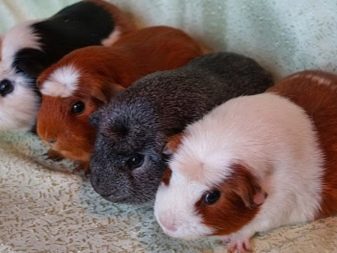
Even in the most favorable conditions of keeping this animal at home, individual individuals rarely live up to 8 years. Examples of such an average life expectancy at home may include the following:
- inappropriate environment;
- dishonest care;
- malnutrition;
- neglect of the symptoms of diseases;
- breed, as well as heredity.
Each of these reasons will be discussed in detail below.
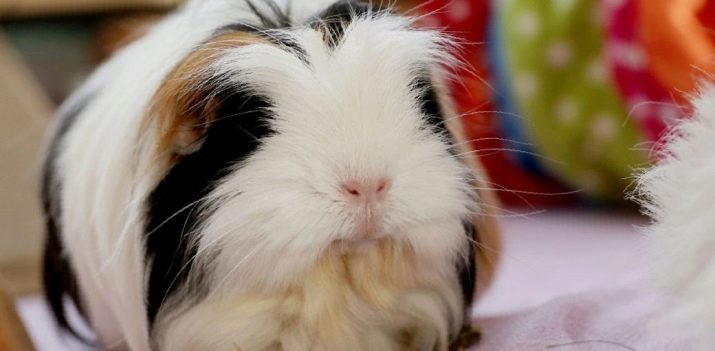
The content of guinea pigs in zoos and aviaries suggests an even greater reduction in the potential lifespan of these animals. The reasons may be as follows.
- Poor feed, dirty water. Typically, such animals are kept in small groups of up to 10 individuals. Food for so many animals is most often bought in bulk and stored in a specific place, for which there is no thorough care. Which already affects its quality. The same applies to dietary diversity, which an individual in captivity clearly will not receive.
Simply put, caring for a single individual at home is usually much more effective than caring for the same single individual in private animal breeding and storage facilities.
- The quality of care. Untimely replacement of the old feed with a new one, the assumption of rotting of old products, insufficient care of the enclosures due to the large number of other animals, as well as the lack of minimal entertainment and toys.
- Constant nervous tension. Any animal from the zoo needs time to get used to the fact that he is teased, summoned, it is not clear what they feed him and are constantly distracted. Against the background of these actions, mental disorder and depression may develop, to which guinea pigs are also subject. Animals with such disorders do not remain in the zoo for a long time, especially animals such as guinea pigs.
All that these animals have in their cells is socialization in a society of their own kind. However, when it comes to socialization and the rules of care, care should still be a priority.
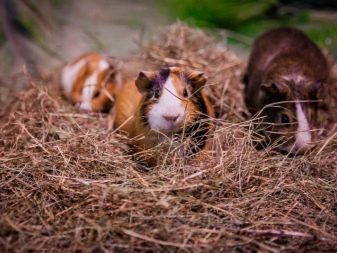
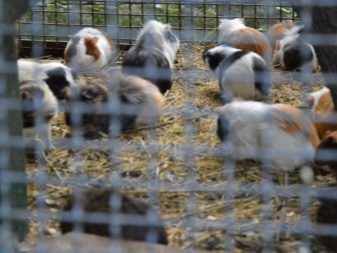
Factors Affecting Life Span
All varieties of guinea pigs also differ in interbreed characteristics. There are 3 varieties of guinea pigs, depending on the thickness of the hairline.
- Longhaired guinea pigs breeds such as Peruvian, Abyssinian, Sheltie, Coronet. All pigs from this list have a long coat, which requires careful care. They do not live particularly long, the average life expectancy is from 5 to 6 years.
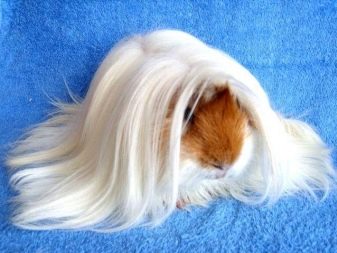
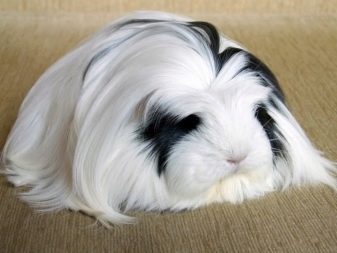
- Shorthair Guinea Pigs do not require large and painstaking care and live up to 8 years. Famous breeds: American, christened, Himalayan, texel, royal.
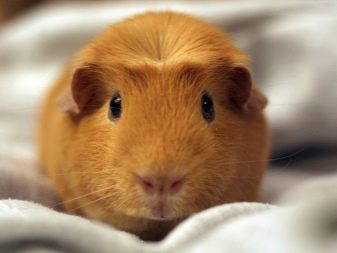
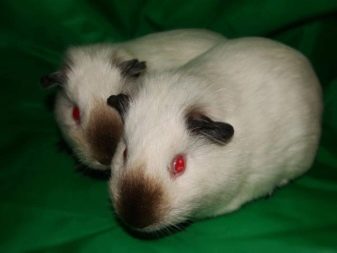
- Hairless guinea pigs were bred for people with an acute and uncontrolled form of allergy to the hair of these animals. They have an average life expectancy of 4 years, some individuals are able to live up to 8 years. These pets are the easiest to care for due to the lack of problems with the hair. Famous breeds: skinny, baldwin.
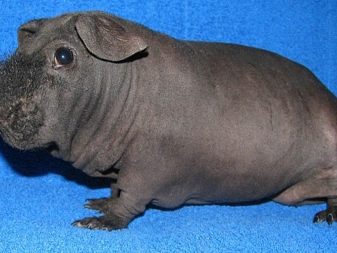
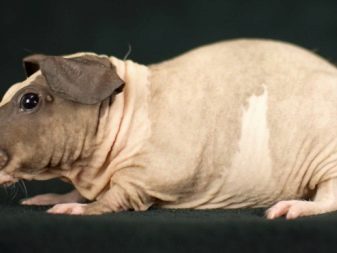
The lifespan of any pet depends not only on its species or breed, most often it is the result of a whole range of conditions. Conditions of detention - the first thing you should pay attention to when buying an animal. Guinea pigs can hardly be called finicky animals, however, in some environments they feel good, and in some they are able to quickly wither. What it depends on, we will consider further.
An enclosure, cage or pet container should be both spacious, wide, and not particularly tall. The material for the cage must be durableso that the animal couldn’t gnaw at it and was quite heavy, so that the design from the weight of an adult did not turn over during games or feeding. As such materials, metal or glass is usually chosen.
- Metal cells they are good because oxygen circulates through them, they are durable and easy to clean.
- Glass the heavier one, it becomes more polluted faster and does not let in fresh air so well, especially if it is a continuous aquarium. At the same time, metal cells are much more expensive.
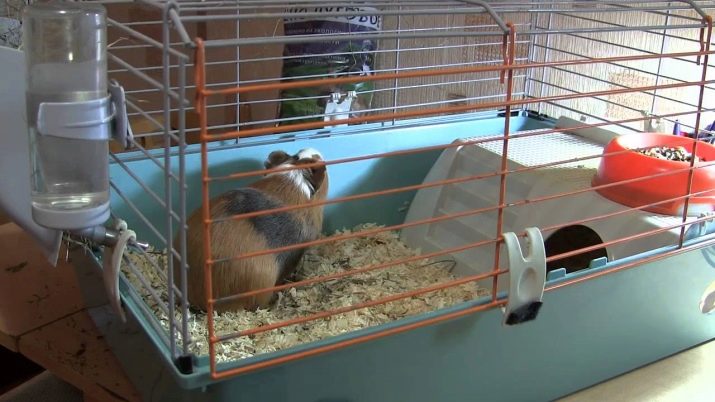
The main condition for any cell is a large amount of free space for recreation and entertainment.
Be sure to put objects for games in the cage, it can be perches, horizontal stairs, houses, tunnels, a wheel. Games stimulate the physical activity of the animal, give it more strength. Physical procedures have a beneficial effect on health, strengthen the body, burn excess fat and improve digestion.
Guinea pigs belong to those pets that do not tolerate being in the same space for a long time. Amid boredom, real depression can develop. To avoid this, sometimes it is enough to take the pig out for a walk somewhere out of town. Avoid walking in parks and courtyards near roadways and industrial plants. It is better to do this somewhere near the city, after checking the meadow vegetation for harmful plants and herbs.
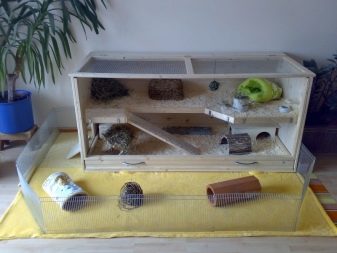
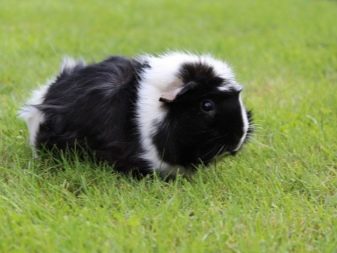
If you’re afraid of letting your pet out on the street, you can send him for a walk around the room under watchful supervision, but make sure that the animal does not take anything harmful into its mouth, it is especially dangerous to eat house plants. Many of them are very dangerous for guinea pigs.
A predisposition to diseases caused by improper diet or care also has a significant effect on the life span of the animal. Guinea pigs have strong immunity, however, it can be weakened by malnutrition.
And here it is extremely important to keep track not of the diseases themselves, but of the first symptoms and signs, in order to prevent the disease at the initial stage.
Symptoms may be as follows:
- the animal looks sluggishly, moves slowly or does not move at all;
- wheezing and labored breathing, shortness of breath;
- the animal is observed systematic seizures with convulsions and tremors;
- the hairline begins to fall out, abscesses and ulcers form on the body;
- gastrointestinal tract malfunctions - diarrhea, constipation;
- poor appetite or lack thereof, intense thirst;
- eyes watery, from the nose of the animal flows;
- the coat looks fallen and clumped;
- scratches are observed throughout the body, the animal can not sit still.
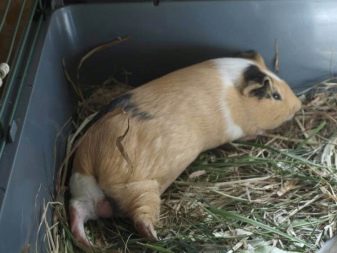
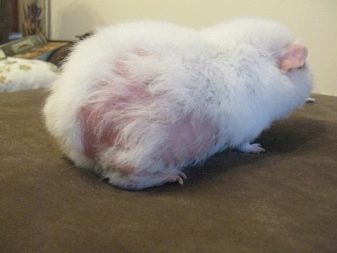
If any of these symptoms are found, you should immediately contact your veterinarian.
The best way to determine the current state of the pet is to play games. It is from the activity and movements of the animal that you will understand that something is wrong with it. No self-medication!
Heredity - One of the most important factors that you should pay attention to when choosing and buying a guinea pig. Buying a pig directly at the pet store is good because you are given documents with information about the parents, as well as the hereditary predisposition of the animal to certain diseases. Unfortunately, when the disease appears, you can not do anything about it or somehow affect the outcome.
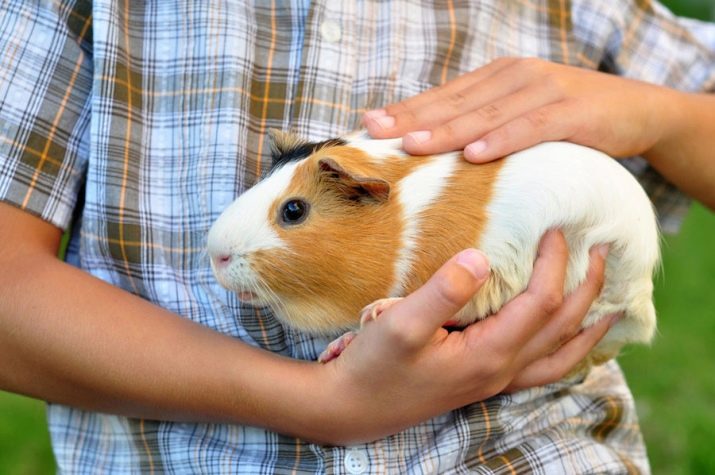
Proper nutrition - Another important factor on which depends not only the well-being of the animal, but also its mood, level of activity and playfulness. This animal is a gourmet regarding feeding. For example, guinea pigs suffer from vegetables and fruits with high acidity (lemon), fruits and berries with a high fructose content are also extremely harmful to them (tangerines, strawberries, blueberries), like all dairy products (milk, cheese, cottage cheese), meat and bakery products (meat, bread, bread). Eating any product on this list could potentially result in the death of your animal.
Another important point concerns the absorption of ascorbic acid or vitamin C, which the gastrointestinal tract of these animals cannot physically synthesize. It follows that every day in the diet should be either synthetic vitamin C, or its natural replacement in the form of fruits and vegetables.
Another problem in the diet of guinea pigs is binge eating. The fame of indefatigable gluttons, who do not know when to stop, has entrenched themselves in animals.
If you do not make sure that the doses of food are the same and regular, and not large and spontaneous, it is likely that your pet will become obese. And obese guinea pigs, as a rule, do not live long.
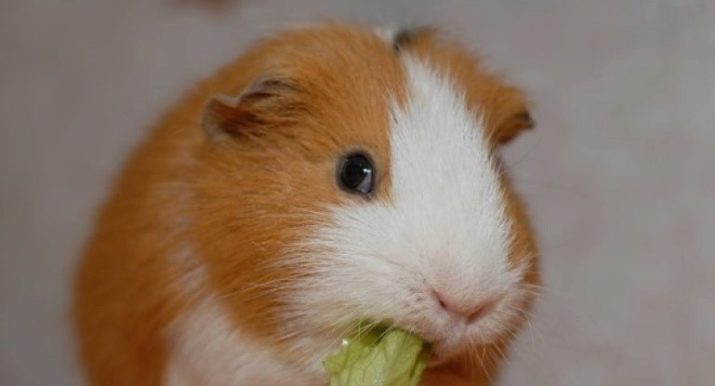
The daily diet should consist of the following foods:
- special feeds, green or dry - 60%;
- hay, tree branches, goodies - 20%;
- fruits and vegetables - from 15 to 20%, vegetables should be given every day in small quantities, fruits - every other day.
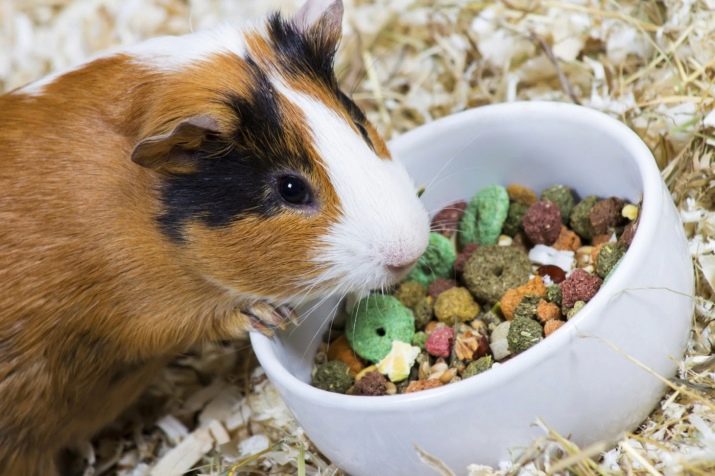
How to care?
Not only nutrition, conditions of living, or heredity form life spans in guinea pigs. It all depends very much on your regular animal care. Mumps do not belong to those pets that can simply be put in a cage and left there for the whole day. There is a set of rules that every guinea pig breeder must adhere to. You can find them below.
- All food and water must be fresh.. The water tank should not contain any dirt or food debris. All excess vegetables and fruits should immediately be removed from the aviary, otherwise they may deteriorate. Change the water every day, it should be fresh, but settled. Also try to regularly clean the cage for the animal.
- An aviary, cage or container with an animal should be placed in a distant warm corner of the room. The place should be well ventilated, without drafts and direct sunlight.
- Watch your pet look. Buy a special comb to tidy the hair at the withers and torso of the animal, otherwise mats will form. Regularly clean your pet's ears and eyes, check for parasites and dirt, mucus.
- If you give the animal only succulent food and fruit (to the detriment of dry food), you may encounter the problem of overgrown teeth. You should not sharpen them yourself, otherwise you will harm the animal. The procedure can be ordered from the veterinarian.
- In addition to dealing with overgrown teeth, over time there will be a problem with claws that are too long. Growing, they can not only prevent the pig from moving, but also harm you when you pick up the animal in your arms. There are special tools for grinding the claws, however, it will be easiest to use a claw cutter. In order not to harm the animal even more, cut off only those parts that really bring him obvious discomfort.
- Be careful about prescribing water treatments for your pet.. In the wild, this animal can hardly be called cleanliness, and therefore washing should be carried out only if necessary. For baths, special hypoallergenic shampoos on a natural basis should be used. After the bathing procedure, do not forget to dry your furry friend, otherwise he will catch a cold.
- The approximate temperature of the water when bathing should be at least 32 degrees. If we talk about a favorable average temperature, then under normal conditions it should be at least 18 degrees Celsius. Anything lower, even though the hair is plentiful, means coolness for guinea pigs.
- The litter in the cage should be natural, the hay is most often used which needs to be cleaned regularly at pollution.
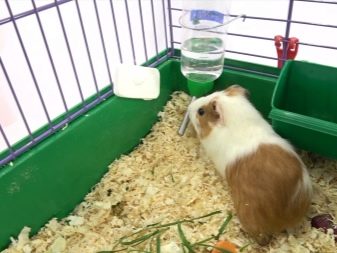
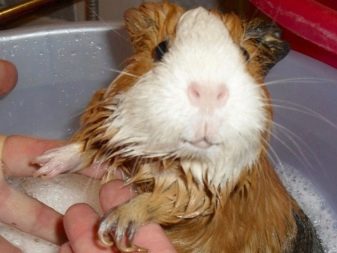
How to determine the current age?
Unfortunately, there are no exact ways to determine the current age of an individual individual, up to a month or a day, you will have to trust the seller or breeder when you buy the animal. Thanks to the factors below, you can determine the approximate age of your furry friend.
- Young and still gaining individuals always more active and mobile, they cannot sit still for a minute, stick their nose literally in all corners.
- Adult growth reaches about 25-30 cm, which concerns the weight, it is from 800 to 1000 grams in females and from 1 to 2 kilograms in males.The weight of young (less than a month) individuals rarely reaches more than 500 grams.
- Much can be learned from the state of the coat. If she is brilliant, young, not crumpled, well-groomed, soft, then by all these signs you will find a young individual no older than 3-4 years old. If bald spots, bedsores or lumps in the coat are present, the individual is older than 4 years.
- The approximate age can also be found by the cutters: in young individuals they are snow-white in color, in adults and old individuals the color is close to yellow.
- Claws can also say a lot about age, it can be determined by the shape and presence of cut claws. In addition, the claws of young individuals are slightly transparent and smooth; in old individuals, they can be bent in different directions and slightly bumpy.
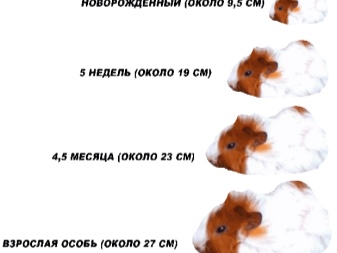

It is not recommended to buy individuals older than 2 years. As a rule, they are already adapted to strictly defined food and specific conditions of detention. Pets will be long and painfully accustomed to a new diet and environment. Small guinea pigs are much easier to teach. Moreover, diseases at an early age are much easier to treat than during full maturity.
When buying, you should ask the seller for documents, where the exact current age and birth weight will be indicated. Based on these two factors, you can determine whether they are trying to deceive you.
If you draw a parallel between the age of these animals and human life, it turns out that one year of their life is 12-15 our years.
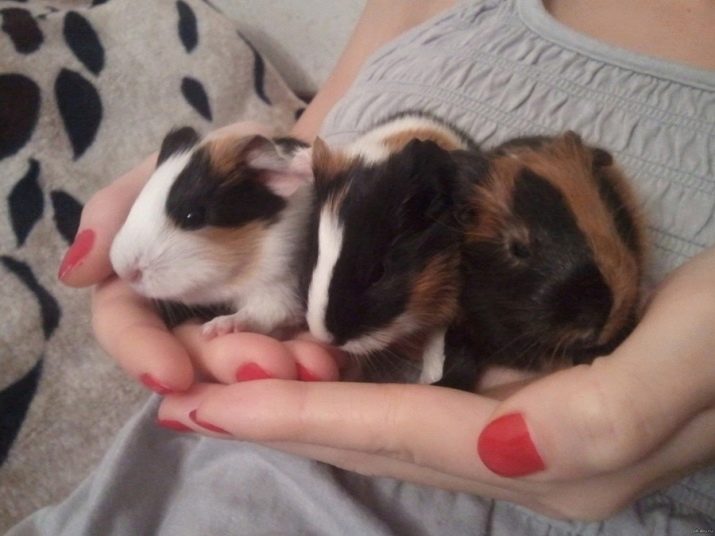
For more information on guinea pigs, see the next video.
